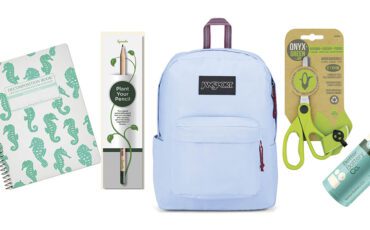Make Your Child’s Middle School Years Super
Homework, friendships, crushes, puberty — the list of middle school woes can seem intimidating. The middle school years can be a challenging time for both you and your child. Despite their bad reputation, you don’t have to dread these upcoming years.
 Atlanta Parent talked to Phyllis L. Fagell about her new book “Middle School Superpowers: Raising Resilient Tweens in Turbulent Times.” Fagell is a licensed clinical professional counselor and a certified professional school counselor; her book offers practical information for parents to help tweens navigate these formative years. The book features 12 superpowers including agency, daring and optimism that parents can help middle schoolers develop, and each chapter ends with talking points to help you bond with your tween.
Atlanta Parent talked to Phyllis L. Fagell about her new book “Middle School Superpowers: Raising Resilient Tweens in Turbulent Times.” Fagell is a licensed clinical professional counselor and a certified professional school counselor; her book offers practical information for parents to help tweens navigate these formative years. The book features 12 superpowers including agency, daring and optimism that parents can help middle schoolers develop, and each chapter ends with talking points to help you bond with your tween.
Q: Why is middle school a universally difficult time?
One of the things I try to do in my books is challenge the negative cultural rhetoric around middle school. It is a very unique developmental phase. You experience the negatives as more painful, as you are at a point where you have little life experience and perspective. You’re also experiencing puberty, so everything is a 100 on a scale of 1 to 10. You’re pulling away from your parents at the same time that you’re trying to find a place with your peers. You’re suddenly acutely aware of how you stack up to others, and you have this sense everyone is judging you. It makes the bumps and bruises middle schoolers experience more painful, more difficult, more memorable. It’s not that the kids themselves are meaner. Middle schoolers have the reputation that they’re mean and drama-seeking, but they’re still learning and their empathy is still developing. It’s inevitable that they’re going to make mistakes, but they are good people.
Q: What about today’s time makes it even more challenging?
Even before you factor in what’s happened with the pandemic, there’s a 24/7 news cycle with graphic images and upsetting information before they have media literacy. Kids struggle with anxiety for things that were routine a generation ago — a fire alarm didn’t set off alarm bells. They were all born after 9/11, and they’re growing up in a world in which shootings and school violence are daily occurrences. They’ve grown up through a pandemic, and they’re coping now with the aftereffects. They’re growing up in the midst of culture wars and identity issues, when they have a developmental imperative to figure out who they are and if they’re good enough, so it’s an insecure and sensitive time.
Q: What are some positives about the middle school years?
Middle schoolers are so funny and impressionable. Middle school is the last best chance. It’s an opportunity for parents to make a massive difference in turning out a good human. They’re sophisticated enough to understand what we’re saying, and they want to please the adults in their life — even if they don’t seem like they’re interested in our opinion. Middle school is a unique time to coach them and set them up to thrive. As difficult as the challenges can be, we are available for discussions; it is safe for them to fail and come to us for advice. It’s a very fun phase as a parent that we don’t appreciate until it’s over. It’s a time when parents can grow very close to their kids and be a part of their life.
Q: Why is helping your kids develop the superpowers in your book important?
I was writing this book as we were emerging from the pandemic. I was no longer dealing with a typical middle schooler, but instead dealing with “extreme tweens.” The things that used to work were no longer working. Using universal design — the concept that if you design for extremes, you’re actually designing for everyone — so these strategies for extreme tweens could be helpful for any tween. The book is very concrete in terms of evidence-based strategies to impart these superpowers to help kids get through the toughest times. In the midst of societal turmoil, you’re going to raise a resilient adult. These strategies might apply just as much to adults, and I want adults to have the same skills, so they can model them for their kids.
Q: What advice would you give parents about technology and social media?
It’s unrealistic to think that anyone will make their way through adolescence without social media exposure. We want kids to develop self-awareness within the boundaries we’re setting. If middle schoolers think their parents are lecturing them, they’ll shut down. They want agency. Sit next to each other and go through your feeds together. Find that one comment or post that makes you feel uncomfortable in retrospect. Both of you talk about what the conditions were when you made that decision: Were you trying to fit in with people who are only sometimes nice to you? Angry? Jealous? Rather than lecturing, you’re teaching them how to set themselves up for success. You want to give them metacognition about what does or doesn’t work for them and curate their use. You can set limits and take away their phones, and in situations where you have to intervene, help them develop critical thinking skills.
Q: How can you balance being open to communication with your child without steering the conversation?
When you’re communicating with a middle schooler, you have to do it on their terms, even if it’s at 10:30 when you’re tired. When they’re ready to talk, you’re ready to listen. They are not ready to talk when you pick them up from school, as they’ve had interactions all day and are flat-out exhausted. All the time, I hear, “My kid is in their room, and they won’t come out; when do I need to worry about them?” When parents pester kids with what’s wrong or why aren’t you talking, it can feel very judgmental and confrontational. Instead, approach with curiosity. Stay connected and present. Practice your poker face, so you can listen without reacting. Don’t process your own emotions with your child. Spend far more time listening to understand rather than giving advice. Take the small stuff seriously, because to them, it is the big stuff. It may not seem like the same kind of catastrophe that they didn’t get invited to a party compared to their best friend from age 2 moving away, but it feels like an equal catastrophe to them. If you validate and empathize, rather than trying to talk them out of their feelings, you’ll be more successful. It doesn’t mean you agree, but you understand.
Q: As a parent, how can you be more open to topics of conversation, even if they’re difficult?
Just because a child isn’t talking about it doesn’t mean they’re not exposed to it. They have the world in their pocket if they have a phone. You can gauge what they know with, “Here’s this news article; is that something you’ve heard about?” It’s opening it up to talk with you if they want to. Understand that when they’re 11 or younger, they can’t handle violent images. If they see news of a school shooting on one network, and when you change the channel, it’s on another network, they interpret it as happening in multiple places. You don’t want to overexpose them. Figure out what they’re anxious about and address those specific concerns to the best of your ability. Help them feel a sense of safety, hope and optimism.
Q: How can you use media to open up conversations with your tween?
As a middle schooler, everything is too personal, even questions that aren’t personal. Books, movies and music lyrics come in handy. Talking about characters that are not them gives them emotional distance. It can also make them more empathetic when you’re grounding them in a fictional context.
As an example, my kids would watch “The Bachelor,” and I hated it. It’s an unrealistic perception of how people bond and what a good relationship looks like. My kids thought it hilarious that I would yell at the TV. It was funny, and it was a relaxed way to talk about what a healthy relationship looks like in the context of a TV show.








